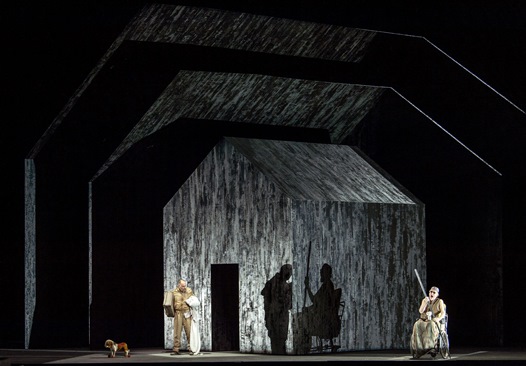György Kurtág's Opera in Amsterdam

Leigh Melrose (Clov) and Frode Olsen (Hamm) (Photo: Ruth Walz)
Four months after its premiere in La Scala, on March 6, Kurtág’ Fin de partie was revisited in the Dutch National Opera. The cast was identical with that of the world premiere: Frode Olsen (Hamm), Leigh Melrose (Clov), Hilary Summers (Nell) and Leonardo Cortellazzi (Nagg); the Nederlands Radio Philharmonic Orchestra was conducted by Markus Stenz, the performance was directed by Pierre Audi.
Selection from the press echo:
The pieces by Samuel Beckett have often been linked to jet-black expressionism, to hell and damnation at Bosch. The opera version of Fin de partie keeps it abstract. At most, a hint of mild ridicule can be detected. The chopped figures that populate Beckett's desolate world: this time they are also missing their brutal features. György Kurtág lovingly embraces them with his musical conversion. His endgame sounds humane, almost tender.
Kurtág must have felt strongly about the rhythm of Beckett's monologues: the sung text is on the skin. In their most lyrical moments they also cherish the four expired creatures. The orchestra becomes a precision instrument at Kurtág, which sets well-aimed accents and exclamation marks. A crumbling melody, set on accordion, is stopped by rustling percussion. Kurtág blows fragile soap bubbles between massive nut clusters. The final is rolling in strong waves. It seems to fade out like a lullaby, but then springs up again. Between resignation and wonder about human fate: this is how this moving music theater ends. It leaves you perplexed.
(Gert van der Speeten, De Standaard)
A more perfect marriage of text and music could hardly be imagined. Almost as perfect as the love of Nell and Nagg, who live out their lives in adjacent garbage cans – or indeed of Kurtág and his wife Márta, who for seven decades has been his indispensable helpmate in composition and performance. Kurtág’s Fin de Partie is a last, loving farewell to the era of 20th-century high modernism, now long since succeeded by different idioms and ideas of what classical composition might be. Yet Kurtág’s idiom hardly feels dated. Like Messiaen’s St. François d’Assise, Kurtág sums up all his own musical past but also the tributaries that flowed into his own utterly individual style: the eloquent recitatives of Monteverdi and Debussy, the lapidary concision of Webern, the vivid coloration of Messiaen himself. Kurtág’s music has long been concise; in that respect he most overtly resembles Webern. Yet as the opera goes on, the music seems to expand, wrapping the characters and their lines in warm, elegiac sadness. By the end – maybe throughout – it is very, very beautiful.
(John Rockwell, Classical Voice North America)
 Kurtág stands as the master of the musical miniature. Every note has been reduced to the bare essence. With almost nothing, Kurtág manages to make the inner states of mind and emotional conflicts of the main characters audible. His music has a merciless directness and despite the minimalist approach, Kurtág has an enormous range of sound colors. His Fin de partie is a true musical masterpiece. It is a well-balanced mixture of thin harmonies, (sometimes) slavic rhythms, rustling, scratching, knocking and blood-curdling eruptions of the brass instruments. It is an extremely theatrical score in which everything, in the finest details, falls into place. A score that was performed by Markus Stenz and the Radio Philharmonic Orchestra with admirable flexibility and accuracy.
Kurtág stands as the master of the musical miniature. Every note has been reduced to the bare essence. With almost nothing, Kurtág manages to make the inner states of mind and emotional conflicts of the main characters audible. His music has a merciless directness and despite the minimalist approach, Kurtág has an enormous range of sound colors. His Fin de partie is a true musical masterpiece. It is a well-balanced mixture of thin harmonies, (sometimes) slavic rhythms, rustling, scratching, knocking and blood-curdling eruptions of the brass instruments. It is an extremely theatrical score in which everything, in the finest details, falls into place. A score that was performed by Markus Stenz and the Radio Philharmonic Orchestra with admirable flexibility and accuracy.
(Oswin Schneeweisz, De Theaterkrant)
Hilary Summers (Nell) and Leonardo Cortellazzi (Nagg) (Foto: Ruth Walz)
Four figures locked in themselves, unable to make contact, circling around each other. They are waiting for their end, an end that will not come. For me this is an opera that deals with the will to achieve, the ambition, the tendency of people to always want to move forward. All that is, Kurtág and Beckett say, an illusion. That is what Kurtág must have appealed to and that is what he is shaping here musically. And he does that first and foremost with a great deal of respect for Beckett's text and language. The scenes that he copied sound integral and Kurtág fully adapts to the rhythm of Beckett's language with his music.
What happens here at the National Opera borders on the unspeakable. Kurtág and Beckett and then this result in the direction of Pierre Audi, with the music phenomenally played by the Radio Philharmonic Orchestra, conducted by Markus Stenz and with four soloists who bring this incredibly complex piece to a superior end. Frode Olsen puts Hamm in exactly the right mix between malice and helplessness, Leigh Melrose is brilliant as the excited, helpless, but just as aggressive Clov, Leonardo Cortellazzi is excellent cast as the somewhat naive Nagg and finally we hear Hilary Summers as a dreamy Nell.
(Ben Taffijn, Niuwe Noten)
 Deutsch
Deutsch English
English Español
Español Français
Français Magyar
Magyar Polski
Polski Română
Română Slovenščina
Slovenščina 中文
中文